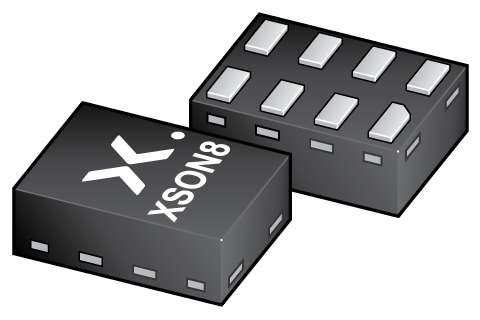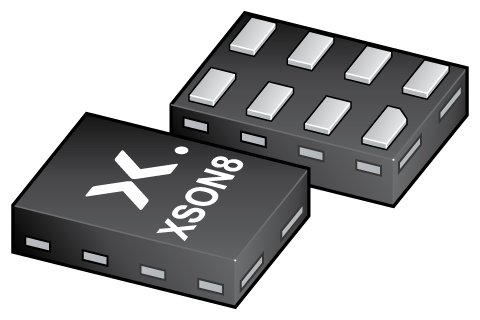
Register once, drag and drop ECAD models into your CAD tool and speed up your design.
Click here for more information74AUP1G885GF
Low-power dual function gate
The 74AUP1G885 is a dual function gate. The output state of the outputs (1Y, 2Y) is determined by the inputs (A, B and C). The output 1Y provides the Boolean function: 1Y = A × C. The output 2Y provides the Boolean function: 2Y = A × B + A × C.
Schmitt-trigger action at all inputs makes the circuit tolerant of slower input rise and fall times.
This device ensures very low static and dynamic power consumption across the entire VCC range from 0.8 V to 3.6 V.
This device is fully specified for partial power down applications using IOFF. The IOFF circuitry disables the output, preventing the potentially damaging backflow current through the device when it is powered down.
Alternatives
Features and benefits
Wide supply voltage range from 0.8 V to 3.6 V
CMOS low power dissipation
High noise immunity
Low static power consumption; ICC = 0.9 µA (maximum)
Overvoltage tolerant inputs to 3.6 V
Low noise overshoot and undershoot < 10 % of VCC
IOFF circuitry provides partial Power-down mode operation
Latch-up performance exceeds 100 mA per JESD78 Class II
Complies with JEDEC standards:
JESD8-12 (0.8 V to 1.3 V)
JESD8-11 (0.9 V to 1.65 V)
JESD8-7 (1.2 V to 1.95 V)
JESD8-5 (1.8 V to 2.7 V)
JESD8-B (2.7 V to 3.6 V)
ESD protection:
HBM: ANSI/ESDA/JEDEC JS-001 class 3A exceeds 5000 V
CDM: ANSI/ESDA/JEDEC JS-002 class C3 exceeds 1000 V
Multiple package options
Specified from -40 °C to +85 °C and -40 °C to +125 °C
Parametrics
| Type number | Package name |
|---|---|
| 74AUP1G885GF | XSON8 |
PCB Symbol, Footprint and 3D Model
| Model Name | Description |
|---|---|
|
|
Package
All type numbers in the table below are discontinued.
| Type number | Orderable part number, (Ordering code (12NC)) | Status | Marking | Package | Package information | Reflow-/Wave soldering | Packing |
|---|---|---|---|---|---|---|---|
| 74AUP1G885GF | 74AUP1G885GF,115 (935291472115) |
Withdrawn / End-of-life |

XSON8 (SOT1089) |
SOT1089 |
REFLOW_BG-BD-1
|
SOT1089_115 |
Environmental information
All type numbers in the table below are discontinued.
| Type number | Orderable part number | Chemical content | RoHS | RHF-indicator |
|---|---|---|---|---|
| 74AUP1G885GF | 74AUP1G885GF,115 | 74AUP1G885GF |
|
|
Series
Documentation (12)
| File name | Title | Type | Date |
|---|---|---|---|
| 74AUP1G885 | Low-power dual function gate | Data sheet | 2024-08-12 |
| AN11052 | Pin FMEA for AUP family | Application note | 2019-01-09 |
| Nexperia_document_guide_MiniLogic_MicroPak_201808 | MicroPak leadless logic portfolio guide | Brochure | 2018-09-03 |
| SOT1089 | 3D model for products with SOT1089 package | Design support | 2019-10-07 |
| aup1g885 | aup1g885 IBIS model | IBIS model | 2013-04-07 |
| Nexperia_document_Logic_CombinationLogic_infocard_201710 | Combination logic solutions card | Leaflet | 2019-08-09 |
| Nexperia_document_leaflet_Logic_AUP_technology_portfolio_201904 | Nexperia_document_leaflet_Logic_AUP_technology_portfolio_201904 | Leaflet | 2019-04-12 |
| Nexperia_package_poster | Nexperia package poster | Leaflet | 2020-05-15 |
| XSON8_SOT1089_mk | plastic, extremely thin small outline package; no leads; 8 terminals; 0.55 mm pitch; 1.35 mm x 1 mm x 0.5 mm body | Marcom graphics | 2017-01-28 |
| SOT1089 | plastic, leadless extremely thin small outline package; 8 terminals; 0.35 mm pitch; 1.35 mm x 1 mm x 0.5 mm body | Package information | 2022-06-03 |
| REFLOW_BG-BD-1 | Reflow soldering profile | Reflow soldering | 2021-04-06 |
| MAR_SOT1089 | MAR_SOT1089 Topmark | Top marking | 2013-06-03 |
Support
If you are in need of design/technical support, let us know and fill in the answer form we'll get back to you shortly.
PCB Symbol, Footprint and 3D Model
| Model Name | Description |
|---|---|
|
|
How does it work?
The interactive datasheets are based on the Nexperia MOSFET precision electrothermal models. With our interactive datasheets you can simply specify your own conditions interactively. Start by changing the values of the conditions. You can do this by using the sliders in the condition fields. By dragging the sliders you will see how the MOSFET will perform at the new conditions set.
